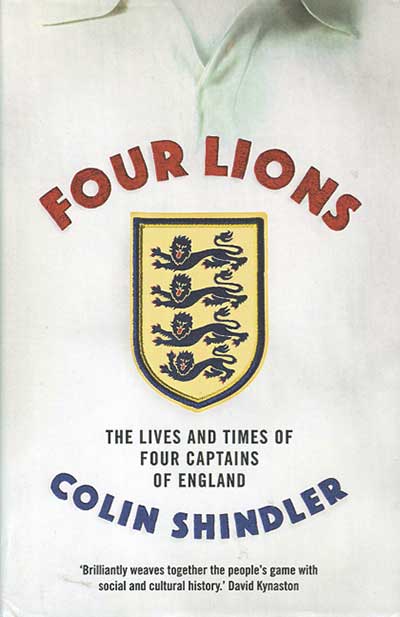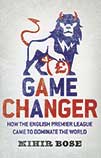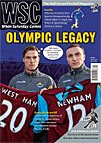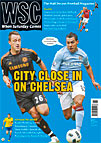A special two-part podcast documentary as When Saturday Comes reaches 400 issues. In this first episode, contributors including co-founders Andy Lyons and Mike Ticher, writers Harry Pearson, Barney Ronay, Taylor Parkes, Joyce Woolridge, David Stubbs, Al Needham, Archie MacGregor and Cameron Carter, photographer Colin McPherson, illustrator Tim Bradford and magazine editorial staff discuss the early days of WSC, first encounters and contributions, favourite articles, and that Tim Lovejoy book review.
Search: 'Tim Lovejoy'
Stories
 The lives and times of four captains of England
The lives and times of four captains of England
by Colin Shindler
Head Of Zeus, £18.99
Reviewed by John Earls
From WSC 356 October 2016
With barely a shrug at Wayne Rooney continuing as captain despite being an increasingly controversial choice for his club side, Cambridge University academic Colin Shindler has chosen an unfortunate time to launch his high-concept social history linking the state of the nation to England’s captains of the era.
 How the English Premier League came to dominate the world
How the English Premier League came to dominate the world
by Mihir Bose
Marshall Cavendish Business, £14.99
Reviewed by Huw Richards
From WSC 311 January 2013
Mihir Bose is an authentic journalistic heavyweight. Before becoming the BBC’s first sports editor he made his mark as Britain’s pioneer of serious sports business journalism. He has been ringside for every major sports story of the past 30 years and ranges well beyond that, with a catalogue including subjects such as Bollywood, the financial crash of 1987-88 and Indian nationalist Subhas Chandra Bose (no relation).
So it is hard to think of anybody better qualified to attempt a definitive account of the Premier League. Sadly the attempt rather fails – maybe he knows too much. Some detail, like the reminder that Sky were forced by smaller clubs on the giants, who generally favoured ITV, is highly relevant. Much more is head-spinningly complex and some – such as what was eaten at important lunches – simply unnecessary.
It is oddly structured, with a long diversion into essays on Alex Ferguson, Arsène Wenger and José Mourinho. None is bad in itself, and Ferguson is vividly portrayed, but in covering such excessively well-trodden ground the narrative loses a momentum it never really regains.
It starts badly with a chapter on football in the 1980s that fails to address the fact that crowds rose steadily from their 1986 lowpoint, making it possible that the Premier League inherited, rather than created, the upturn, and mentions the 1990 World Cup only in passing. If he is to convince that football was irredeemably horrible then he needs better witnesses than Tim Lovejoy and Piers Morgan. Hearing that a teenage Piers was clocked by a pint of piss at Highbury in 1983 will make more readers cheer than wince.
That typifies a problem with sources. Bose is not an unconditional admirer of the league but he appears not to have read its most cogent critics – the bibliography cites GQ and a welter of biographies but nothing by the Guardian‘s David Conn.
He has little time for organised fans and is critical of Manchester United’s followers, while giving plenty of space to City advocates for the Glazers. Those voices are worth hearing but they’ll have to do better than arguing that “If the Glazers walk away from United tomorrow, United is a sustainable business. You haven’t got an uneconomic club like Chelsea”, entirely ignoring that “a sustainable business” is what the Glazers took over.
Similarly, quoting figures to show that Wigan’s turnover is proportionately closer to United’s than it used to be ignores that one club has risen three divisions while the other stayed where it was. Numbers purporting to prove that the Premier League is outpacing its rivals actually show La Liga and the Bundesliga keeping up in absolute terms and making ground proportionately.
Apparently written in haste, this book desperately needed a rigorous editor. There’s a decent read in here somewhere, probably around two-thirds the length plus the index which, unforgivably for a serious factual work, this lacks.
 Taylor Parkes despairs at how laddism became the major representation of football fans in the media
Taylor Parkes despairs at how laddism became the major representation of football fans in the media
Through the wonders of modern technology, I’ve been watching 15-year-old episodes of David Baddiel and Frank Skinner’s Fantasy Football League (why I’ve been doing this, when hairshirts are so cheap, is a matter I’ve placed in the hands of my therapist). These days, as you might expect, this once-hip horror looks dreadfully dated and often painfully unfunny, a very obvious ancestor of Lovejoy and Corden’s boorish bollocks.
 Simon Tyres rises early on a Sunday morning to review the football-related programming
Simon Tyres rises early on a Sunday morning to review the football-related programming
Sunday morning television is an odd thing. If it’s not soap omnibuses or Tim Lovejoy operating a whisk, trying desperately to make out that this is how he saw his career going all along, it’s ethical debate shows in the old God slot featuring panellists chosen for their lightness towards universal tolerance. Turning on BBC1 to find Terry Christian taking the moral high ground, any moral high ground, makes you wonder if the last two decades of broadcasting progress were in vain.